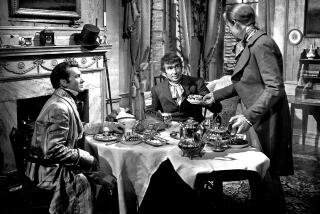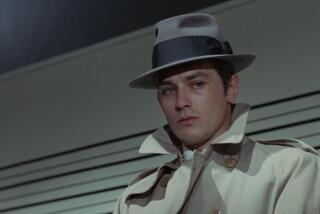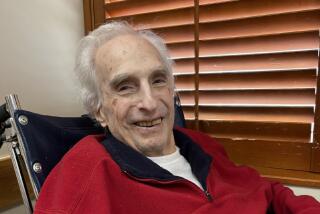From the Archives: Boris Karloff Dies in London Hospital at 81
The Frankenstein monster “was the best friend I ever had. He was the thing that made me, that lifted me from wherever I was to wherever I’ve gotten,” said William Henry Pratt a decade ago.
Pratt, better known to the world as Boris Karloff—and best known as the Frankenstein monster—died Sunday in London in King Edward VII Hospital of a respiratory ailment. He was 81.
Though he was the arch-monster who thrilled and terrified millions of youngsters through three generations, Karloff was a gentle man and thoughtful actor—a monster of discernment who disapproved of modern movie monsters as “dehumanized creatures presented without sympathy.”
“The original monster and my later roles as his creator are tales of mystery and adventure,” Karloff maintained. “Our stories were nearer to Grimm’s Fairy Tales or Edgar Allen Poe.”
Despite more than 130 film roles including monsters, revived Egyptian mummies, zombies and mad scientists from the test tube days to the computer era, Karloff in his private life was a soft-spoken, lisping, quiet man fond of reading poetry and puttering in his garden.
Born in Dulwich, Eng., on Nov. 23, 1887, he was expensively educated on the assumption he would follow his father in consular service.
The youngest of nine children, Karloff appeared in a church Christmas pantomime at 10. His brothers forbade further appearances because of their determination that he should follow in his father’s footsteps.
But at 21, in 1900, he broke with his family and emigrated to Canada, where he worked as a farmhand and truck driver in Ontario. Then he moved to Vancouver, B.C., and worked as laborer and logger until he joined the Harry St. Claire Repertory Company in Prince Albert.
At the outbreak of World War I he tried to join the British Army but was rejected because of a heart condition. Instead he went to Hollywood in 1919 and played bit parts.
It was about this time that he adopted his mother’s maiden name, Karloff, and then took Boris as a first name, to preserve the Slavic flavor.
In 1931 he was asked to portray a monster, and he recalled later, “A monster, indeed! But I didn’t look a gift horse in the mouth. I needed to eat and I took it.”
This monster came from the pages of the novel “Frankenstein,” by Mary Wollstonecraft Shelley, wife of the 19th century English poet Percy Bysshe Shelley, in which Dr. Frankenstein creates a man out of parts of dead bodies and jolts the monster to life with electric shocks.
“He was inarticulate, helpless and tragic,” Karloff said later of the monster. “I owe everything to him. He’s my best friend.”
Generations of children were drawn to the monster, first in movie houses and later over living-room television, because of Karloff’s sympathetic creation of a monster that was more to be pitied than censured.
Thousands of children wrote compassionate letters to Frankenstein and to Karloff, and Karloff always was especially delighted to know he had communicated something to his youthful audience.
“I’ve been working for years on horror films and I know that children love them,” he once said. “It really isn’t horror to them, you know. It’s exciting adventure … Too many similar pictures today simply rely on shock. That’s bad.”
Called ‘Cannibalism’
The success of “Frankenstein” prompted two more films on the theme—“Bride of Frankenstein” and “House of Frankenstein”—and “Frankenstein 1970” in the late 1950s—a project which Karloff termed “sort of a form of cannibalism.”
After that, Karloff promised:
“I’ll never play the monster again because I have sentimental affection for the character. I owe him so much that I owe him a little respect, a little rest.”
When he wasn’t busy with Frankenstein roles, Karloff’s softly sinister manner was employed in such thrillers as “The Body Snatcher,” “Isle of the Dead,” “The Ghoul,” “The Man They Could Not Hang” and “The Invisible Ray.”
Toward the end of his 58-year career as an actor, Karloff scored a hit in the Broadway revival of Barrie’s “Peter Pan.” His role, naturally, was Captain Hook.
He also received critical acclaim for his role as a bishop in Jean Anouilh’s “The Lark,” a play about Joan of Arc, on Broadway in 1956.
Karloff called this role “the high point of my career as an actor.”
Karloff appeared on numerous radio and television shows, once reading bedtime stories to children in his soft, familiar voice, and starred in two television series, “Colonel March of Scotland Yard” and “Thriller.”
Although he lived in the United States for half a century, Karloff retained British citizenship and in 1959 returned to England permanently.
“He always wanted to come back to live in England despite the ghastly taxation because he was English and it was here he wanted to be,” said his widow, Evelyn Helmar Karloff.
She said the veteran actor caught a chill in New York last fall on his way home from making a film in Los Angeles. In November he entered the hospital for treatment for arthritis, heart trouble and lung complications.
“He died in harness and this was the great thing he wanted,” said Mrs. Karloff. “He always said he wanted to work until the end, and this is what he did.”
Karloff, who also leaves a daughter, Sara Jane, by his first marriage, once was asked if he resented being identified all his life with the Frankenstein image.
He replied, “Certainly I was typed. But what is typing? It is a trademark, a means by which the public recognizes you. Actors work all their lives to achieve that. I got mine with just one picture. It was a blessing.”
From the Archives: Face of Great Actress Subtle Even in Death
From the Archives: Fay Wray, 96; Actress, Object of Ape’s Desire in ‘King Kong’
From the Archives: Films’ Paulette Goddard; Was Saucy Star of 1930s and ‘40s
From the Archives: Veteran Actor Vincent Price Dies at 82
From the Archives: Man of Thousand Faces Takes But One to Grave
More to Read
Start your day right
Sign up for Essential California for the L.A. Times biggest news, features and recommendations in your inbox six days a week.
You may occasionally receive promotional content from the Los Angeles Times.







